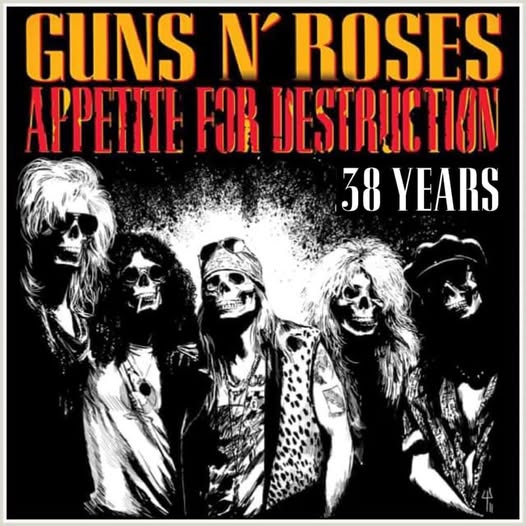
July 21, 1987. It wasn’t just another summer day in Los Angeles. It was a seismic shift—a sonic detonation that would rip through the heart of the music industry and leave it permanently changed. That was the day Guns N’ Roses released Appetite for Destruction, a debut album so wild, raw, and unapologetically dangerous that it didn’t just redefine rock—it revived it.
Now, 38 years later, the scars still glow, the guitars still scream, and the legacy? Untouchable.
Welcome to the jungle. You’ve been living in it ever since.
The Day Rock Got Its Bite Back
In 1987, rock was slick, polished, and dripping in neon. Hair metal ruled the airwaves. Bands looked more like fashion models than rebels. Everything felt manufactured, curated for MTV and mass appeal.
Then came five misfits from Hollywood’s grimy underbelly: Axl Rose, Slash, Duff McKagan, Izzy Stradlin, and Steven Adler. They didn’t care about trends. They weren’t trying to be pretty. They came to burn the house down—and Appetite for Destruction was the gasoline.
From the opening howl of “Welcome to the Jungle” to the bone-snapping aggression of “It’s So Easy” and the scorched-earth anthem “Paradise City,” the album was a 12-track manifesto of chaos, addiction, sex, street fights, heartbreak, and survival. And at its center was a red-headed banshee with a voice like a switchblade and a guitarist whose Les Paul bled blues and hellfire.
This wasn’t glam. This wasn’t safe.
This was war music.
Slow Burn, Big Bang
Appetite wasn’t an instant hit. In fact, it barely made a dent in the charts at first. But something about it kept crawling through the underground, infecting every radio station and tape deck it touched. By the summer of 1988—a full year after release—it hit No. 1 on the Billboard 200.
What followed was a level of success that bordered on myth.
Appetite for Destruction would go on to sell more than 30 million copies worldwide. To this day, it holds the record for the best-selling debut album of all time.
But more importantly? It made rock dangerous again. It stripped away the glitter, the spandex, the fake smiles—and reminded the world that real rock is supposed to be loud, ugly, and honest.
No Filters, No Apologies
Guns N’ Roses didn’t just make an album—they launched a lifestyle grenade.
Axl was pure volatility: a frontman with the voice of a demon-angel hybrid and a temper that could flatten dressing rooms. Slash was the cool chaos, cigarette dangling, guitar wailing, never missing a beat no matter how blurry the night before was. Duff, Izzy, and Steven? Punk roots, blues soul, and swing drummer swagger, all wrapped in leather and liquor.
They weren’t pretending to be rock stars.
They were rock stars before the ink was dry on their first record deal.
And with fame came the infamy: riots, arrests, overdoses, canceled shows, on-stage meltdowns. They were walking contradictions—brilliant and broken, beautiful and brutal. But no matter how many headlines they made, one thing always cut through the noise: the music.
What Made Appetite a Masterpiece?
It wasn’t just attitude. It wasn’t just image.
It was the songs.
“Sweet Child O’ Mine” became the band’s first—and only—No. 1 single in the U.S., anchored by a riff that Slash reportedly thought was a joke when he first played it. Axl’s lyrics turned a power ballad into something personal and haunting, and suddenly, even the most hardened fans were singing along.
“Mr. Brownstone” gave a chilling, honest take on heroin addiction—a theme that would later fracture the band. “My Michelle” was about a real girl, and it didn’t pull punches. “Rocket Queen” closed the album with swagger, scandal (yes, that moaning is real), and a surprising emotional pivot mid-track.
Every note felt like a scream from the edge. Every lyric, a confession in blood.
Legacy of Destruction
Today, Appetite for Destruction is more than just a record—it’s a cultural time bomb that’s still ticking.
It inspired generations of bands to ditch the glam and dig into the grit. It proved that you didn’t need to be perfect to be legendary—you just had to be real. It redefined what a debut album could be and made sure no one ever forgot the names Slash or Axl.
And even after internal implosions, lineup changes, and nearly two decades of silence between the band’s core members, Appetite never faded. When the classic lineup partially reunited in 2016, selling out stadiums across the globe, fans didn’t come just for nostalgia—they came because those songs still hit like a freight train.
38 Years Later: Still Loud. Still Dangerous.
So here we are—38 years later.
Other bands have come and gone. Styles have shifted. Genres have risen and collapsed. But Appetite for Destruction remains untouchable. It’s not just an album—it’s a survival instinct. A snarling, spitting, glorious middle finger to the system that tried to polish rock into oblivion.
Guns N’ Roses didn’t just release an album on July 21, 1987.
They lit a fuse.
And nearly four decades later, the fire still burns.

Leave a Reply